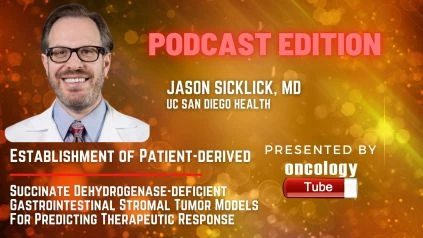Jason Sicklick, MD, Surgical Oncologist, Associate Professor of Surgery at UC San Diego Health speaks about Establishment of Patient-derived Succinate Dehydrogenase-deficient Gastrointestinal Stromal Tumor Models For Predicting Therapeutic Response.
Link to Abstract:
https://clincancerres.aacrjournals.org/content/early/2021/08/20/1078-0432.CCR-21-2092.abstract
a summary –
Purpose:
GIST is the most prevalent gastrointestinal sarcoma, with mutant succinate dehydrogenase (SDH) subunits (A-D) accounting for fewer than 7.5 percent (i.e. 150-200 new cases per year) of new cases in the United States. SDH-mutant GISTs, unlike GISTs with KIT or PDGFRA mutations, afflict teenagers and young adults, often metastasis, and are resistant to tyrosine kinase inhibitors (TKIs). Because there are no human models for any SDH-mutant tumors, including GIST, molecular characterization, and therapeutic development are limited.
Design of the experiment:
We discuss how to create new patient-derived SDH-mutant (mSDH) GIST models and how to test temozolomide’s effectiveness on these tumor models in vitro and in clinical trials of mSDH GIST patients. Results: The transcriptional and metabolic hallmarks of parent tumors and SDH deficiency are recapitulated in our patient-derived mSDH GIST models, according to molecular and metabolic analysis. In our mSDH GIST models, we also show that temozolomide causes DNA damage and apoptosis. A cohort of SDH-mutant GIST patients treated with temozolomide (n=5) showed a 40% objective response rate and 100% disease control rate, indicating that temozolomide is a viable treatment for this subgroup of GIST.
Conclusion:
We provide the first approaches for creating patient-derived mSDH tumor models, which may be used to learn more about patient-specific tumor biology and treatment options. We further show that temozolomide is efficacious in mSDH GIST patients who are resistant to current chemotherapeutic medications (namely TKIs) in clinics for GISTs, providing a viable therapy alternative to clinic for these patients.

